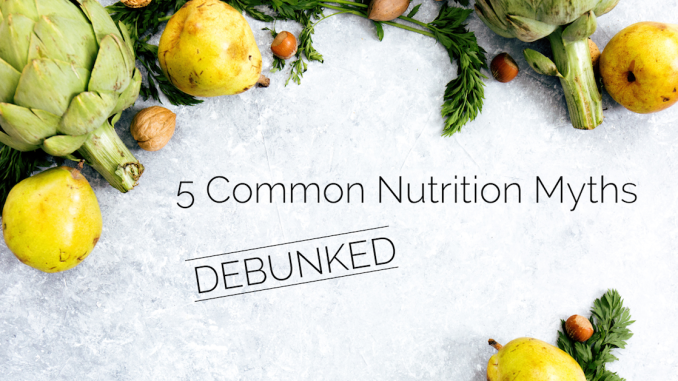
Because of the sheer mass of information that inundates the world today, obtaining good nutrition is difficult. Myths and misconceptions about healthy eating often leave us feeling dizzy. This article aims to expose some nutrition “truths” that are actually fallacies. It will also tell you what you should really know if you want your health to be good.
Myths 1: Carbs Are Bad
Truth: Carbs have gotten a bad rap of late, being associated with weight gain and poor health. Actually, it’s just the opposite quite often. Carbs are the human body’s primary source of energy–they are found in such foods as fruits, vegetables, whole grains, and legumes which are loaded with essential nutrients and fiber. Our task lies in selecting complex carbohydrates over simple sugars. Whole foods can provide long-term energy and help prevent putting on excess pounds to boot.
Myth 2: Fat makes you fat
Truth: Fat is vital to a balanced diet and serves important functions within the body such as hormone and gene expression, nutrient absorption, and the formation of cell walls. What kind of fat makes a difference. Such as, the healthy fats in avocados, nuts and seeds or olive oil will even assist you in shedding unwanted pounds and is good for your heart too. On the other hand, we should stay away from trans fats and limit rather than cut out our intake of saturated fats.
Myth 3: To lose weight, you need to skip meals
Truth: Skipping meals can lead to bingeing later on in the day. A problem with missing meals is that it lowers metabolism and heightens feelings of hunger. Eating meals and snacks at regular times will help keep your blood sugar steady and supply the energy you need for everyday activities. Instead of skipping meals, try eating in a balanced fashion so that you get a range of nutrients. This will help you manage hunger more effectively and build a less ambivalent relationship with food.
Myth 4: Myth: We all need supplements
Refuted: In some circumstances, supplements can be helpful, but they are incapable of replacing a well-rounded diet. Most people should consume whole foods to receive all the necessary vitamins and minerals. When you rely overly much on supplements, it can create an imbalance in your body and bring problems. Before adding any to your diet, however, it’s wise to talk with a healthcare professional.
Myth 5: Myth: Eating at Night Fattens You Up
Refuted: It is too simplistic to claim that eating late at night will in itself cause weight gain. It’s what you eat that matters, not when. Late-night snacks can be part of a balanced diet as long as you are mindful about what you eat. Portion control and choosing healthy foods rather than high calorie but un-nutritious ones is the big key to it all.
Myth 6: Myth: Your body needs to detox
Refuted: The body is an exceptional detoxifier in and of itself, using mechanisms such as the liver, kidneys, and other systems. Many detox diets could actually be not only useless but also harmful. Instead of concentrating on detoxifying yourself, just aim to support your body’s own detox processes by eating a well-rounded diet full of enough fruits, vegetables and whole grains and drinking adequate liquids.
Myth 7: Myth: Vegan & Vegetarian Diets Are Always Healthy
Refuted: A predominantly plant-based diet has a number of health benefits. But it is not necessarily healthy per se. The key is to make certain that the diet is well planned and provides a variety of foods. Many processed vegan and vegetarian products can be low in sugars, harmful fats or salty flavors. Eat whole, mildly cooked foods to get the most benefits and nourishment out of it.
When a fleshy fruit is bitten into, not only the natural sweetness comes but also fiber and nutrients. But the quantities must be kept within limits. The human body deals with all sugars— from table sugar to the other sorts found in fruit juice— the same oxyplain way, almost at once. Eating too many sweets, then, is just as bad for our health as taking in too much sugar from any other source. It is best to watch the total amount of sugar you eat. No matter where it comes form, one must think about one’s health as a whole (First edition 1980) For further information:
With the publishing of this revised edition, knowledge is our responsibility. In the fields of health and nutrition, there is so much wrong advice circulating that if we can only throw out the wrong ideas, our prospects will be better. Contacts registered dietitian or a nutritionist for personalized advice.